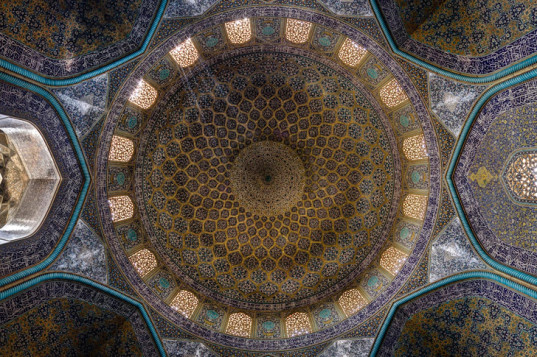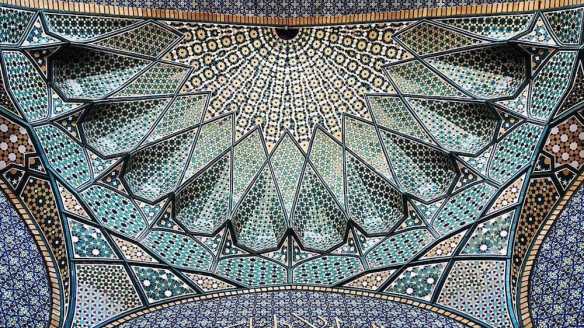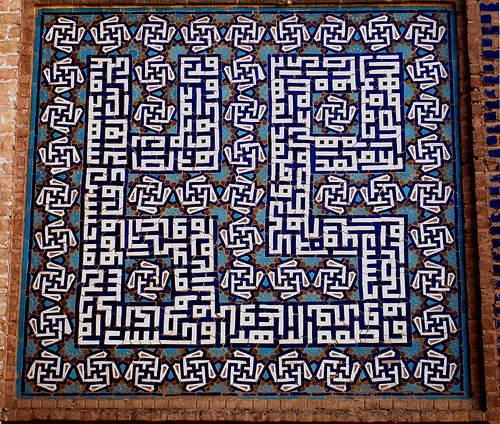
Quran 2:165

وَمِنَ النَّاسِ مَن يَتَّخِذُ مِن دُونِ اللَّهِ أَندَادًا يُحِبُّونَهُمْ كَحُبِّ اللَّهِ ۖ وَالَّذِينَ آمَنُوا أَشَدُّ حُبًّا لِّلَّهِ ۗ وَلَوْ يَرَى الَّذِينَ ظَلَمُوا إِذْ يَرَوْنَ الْعَذَابَ أَنَّ الْقُوَّةَ لِلَّهِ جَمِيعًا وَأَنَّ اللَّهَ شَدِيدُ الْعَذَابِ
“Translation”:
Among the people are some who take peers apart from God, loving them as if loving God. And those who believe are more intense in love for God. If only those who were unjust could see, they would see the punishment/sweetness: that all power is God’s and God is intense in punishment/sweetness.

Tafsir Maybudi
They say that a man met a woman recognizer, and her beauty exercised its influence over his heart. He said, “’My all is busy with your all.’ O woman! I have lost myself in love for you.”
She said, “Why don’t you look at my sister, who is more beautiful and lovely than I?”
He said, “Where is your sister so that I may see her?”
She said, “Go, idler! Passion is not your work. If your claim to love me were true, you would not care about anyone else.”…
Shiblī said, “I learned Sufism from a dog that was sleeping at the door of a house. The owner came out and was driving the dog away, but the dog kept on coming back. I said to myself, ‘How base this dog is! He drives him away, and he keeps on coming back.’ The Exalted Lord brought that dog to speech and it said, ‘O Shaykh! Where should I go? He is my owner.’”
I will not leave the Friend at a hundred iniquities and cruelties.
Even if He increases them, I will not be troubled,
It is I who chose Him over everyone else;
if I complain about Him, I will have no excuse.

Tafsir Kashani
But the believers love God more ardently, than any other, because they only love God. Their love for Him is not confounded with love of others and is not subject to change. They love things through [their] love of God and for God and in the measure that they find in these [things] a divine aspect…
or [it means that] they love [God] more than they love their deities because they love things in themselves for themselves and so inevitably their love changes [for these things] when they themselves change the accidents of their souls upon fear of perdition and the harm that the soul brings upon them. Believers love God through their spirits and their hearts, nay, through God and for God. Their love [for Him] does not change because it is selfless. They expend their spirits and their souls for the sake of His countenance and His approval, abandoning all of their desires for His desire, loving His acts even when they conflict with their caprices, as one of them said: “I desire to connect with Him while He desires to abandon me, so I abandon what I desire for what He desires.”

Tafsir Anon.
Nothing but God is loved, nothing but God is worshipped— Your Lord has decreed that you worship none but Him (17:23)— indeed nothing but God is. However, some limit their love of God to a particular form or forms of His, an idol of sorts.
Those who love God in a limited form, in idols or “peers,” love a limited form, and thus their love is limited. Those who love God, Who is beyond all limitation (and is even beyond the limitation of being beyond limitation) love Him in each and every form, without limitation. Thus their love is unlimited, and more intense. He loves them and they love Him (5:54). They love Him with His love. Those who love the “idols” of a particular form or forms only love “as if with the Love of God” (كحبّ الله), but those who believe, who love of God is not limited by these forms, love God with His own unlimited love—God loves Himself through them.
Those who wrong themselves by limiting their love to a particular form or forms, if they could only see, would know the intense sweetness of love unlimited, and the severe punishment of limited love, especially when compared to sweetness of unlimited love. The pain of regret and envy is severe punishment.

Ibn ‘Arabi
Faṣṣ Harūn:
Have you seen him who has taken desire for his God? (45:23)
The greatest and most exalted locus of self-disclosure wherein He is worshipped is that of desire. Remember that He has said, Have you seen him who has taken his desire for his God? It is the greatest object of worship since nothing is worshipped except through it, and it is only worshipped by itself. Concerning this I say:
The truth of desire is that desire is the cause of desire
If not for desire in the heart, desire would not be worshipped
و حق الهوى إن الهوى سبب الهوى لو لا الهوى في القلب ما عُبِدَ الهوى
Do you not see how perfect God’s knowledge of things is, how He perfects one who worships is desire and takes it has his divinity?… He sees this worshipper worshipping only his his desire, complying with its command to worship the individual whom he worships. Even his worship of God comes from his desire. If one did not have desire for the Divine—which is a will based on love—one would not worship God, nor would one prefer Him to another. Likewise, anyone who worships some form of the world and makes it a divinity only does so because of desire. The worshipper is forever under the influence of his desire. Now, he sees the objects of worship diversified amongst the worshippers, and each one who worships something, denies one who worships something else. One who has the least bit of awareness will be bewildered at the unanimity of desire, nay by the oneness of desire, for it is the same essence in every worshipper. God led him astray, that is, bewildered him, out of knowledge that every worshipper only worships his own desire, and only seeks to worship his desire whether it coincides with the prescribed command or not.
The perfect Knower is he who sees every object of worship as a locus of self-disclosure of the Real wherein to worship Him.

This is why a human being does not become totally annihilated and enraptured by love except in love for His Lord or for someone who is the locus of disclosure for his Lord [that is, another human being, created in God’s image].
The entities of the cosmos are all lovers because of Him, whatever the beloved may be, since all created things are the pedestals for the Real’s self-disclosure. Their love is fixed, they are loving, and He is the Loving. The whole situation is concealed between the Real and creation through creation and the Real. That is why God brought the name Forgiving along with the name Loving [in the verse He is the Forgiving, the Loving, Lord of the Throne, the Glorious (85:14-15)]. After all, Forgiving means literally ‘curtaining’. Thus it is said that [the famous Arab lover] Qays loved Layla, since Layla derives from the locus of disclosure. In the same way, Bishr loved Hind, Kuthayr loved ‘Azza, Ibn al-Durayj loved Lubna, Tawba loved al-Akhyaliyya, and Jamil loved Buthayna. But all these women were pedestals through which the Real disclosed Himself to them.
The beloved is a pedestal even if the lover is ignorant of the names of what he loves. A man can see a woman and love her, without knowing who she is, what her name is, who her relatives are, and where she lives. Love, by its very essence, requires that he seek out her name and her home so that he may attend to her and know her in the state of her absence through the name and the relationship. Thus he will ask about her if he lacks the witnessing of her.
So also is our love for God. We love Him in His loci of self-disclosure and within the specific name, which is Layla, Lubna, or whatever, but we do not recognize that the object is identical with the Real. So here we love the name but we do not recognize that it is identical with the Real. Thus we love the name and do not recognize the entity.
In the case of the created thing, you know the entity and you love. It may be that the name is not known. However, love refuses anything but making the beloved known. Among us are those who know God in this world, and among us are those who do not know Him until they die while loving some specific thing. Then they will come to understand, when the covering is lifted, that they had loved only God, but they had been veiled by the name of the created thing.
—Futūḥāt IV 260.12; Trans. William Chittick “The Divine Roots of Human Love“

Ibn al-Fāriḑ
If I say: I have for you, each and every love
He says: Lovelieness is mine and every beauty is in me
إنْ قُلْتُ:عِندي فيكَ كل صَبابة ٍ؛ قالَ:المَلاحة ُ لي، وكُلُّ الحُسْنِ في
Turn your gaze to the beauties of his face,
Where all beauty has been gathered
If all beauty were perfected into one form
on seeing him, it would exclaim [in wonder],
“There is no god but God, and God is greater.”
فأَدِرْ لِحَاظَكَ في محاسنِ وجْهه تَلْقَى جميعَ الحُسْنِ فيه مُصَوَّرا
لو أنّ كُلّ الحُسْنِ يكمُلُ صُورةً ورآهُ كان مُهَلِّلاً ومُكَبِّر
Shustarī
Her mystery flows through everything
so everything inclines towards her
Whoever witnesses the secret of her beauty says
that it is everywhere, but its fullness is hidden
Original:
كل شِي سرُها فيه سَرَى فلذا يثنى عليها كل شيْ
قال مَن أشهدَ معنى حُسنها إِنه منتشرُ والكل طيْ
She is adorned with each and every kind of beauty
And the people of passion are mad with love for her, wherever she appears.
تحلّت بأنواع الجمال بأسرها فهام بها أهل الهوى حيثُ حلّت
Hafez
Everyone, sober or drunk, seeks the beloved.
Every place, be it mosque or synagogue, is the house of love
همه كس طالب يارند چه هشيار و چه مست
همه جا خانه عشق است چه مسجد چه كنشت
Unknown
Various ways have those who love from (mere) passion
But I have a unique way, in which I dwell alone.”
مذاهب شتى للمحبّين في الهوى و لي مدهب فرد أعيش به وحدي
“Have you ever seen anything more lovely?”
I said, “is there anything else in existence?”

Original
We all long for her loveliness
on earth, in skies above
There is no other beauty
and nothing else to love
I said, “all my love is yours
all loves and for all time.”
She said, “it’s only fitting since
every beauty is mine.”
Love loves Love
and Love is One
that is all there is below
and all there is above







































